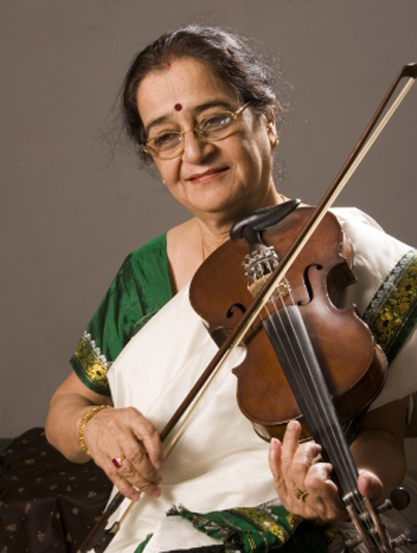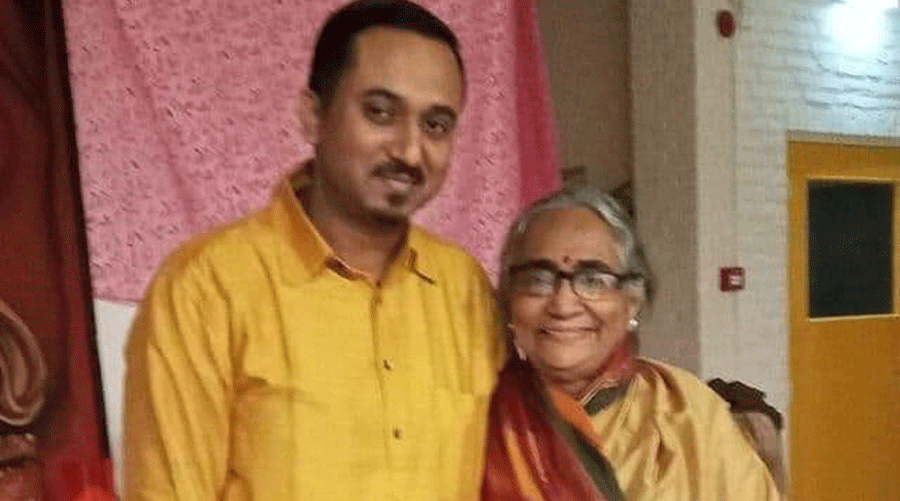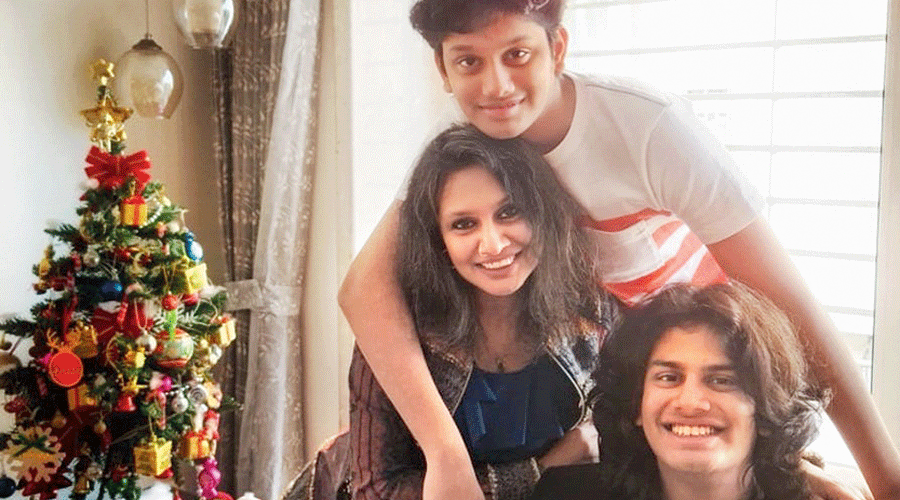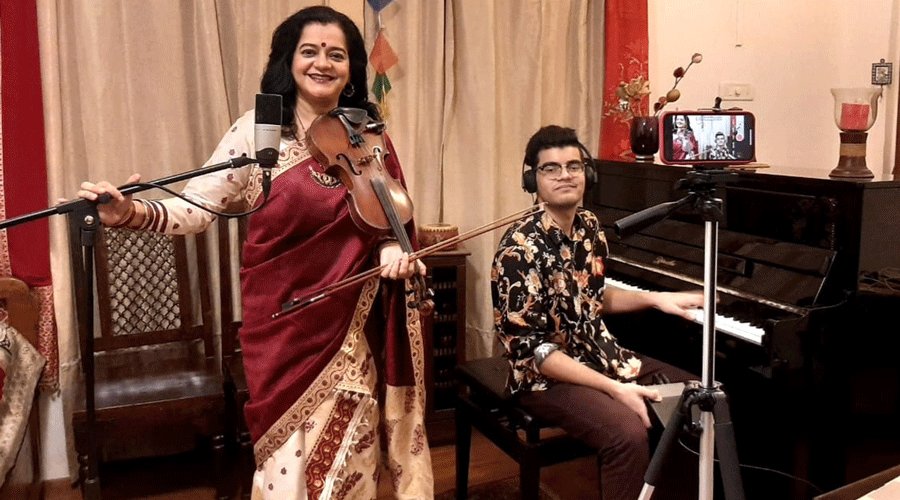Sunita Bhuyan and Ronojit
We loved your performance with your son at The Telegraph She Awards. Do you remember the first time you shared the stage?
Sunita: I remember it very well, we discovered our energy. It was a performance to mark Independence Day and it was done for some underprivileged children. He was in boarding school then and it was monsoon in Mumbai. It was messy and dirty and his first reaction was: “Why did you ask me to perform here?” He had come for many of my grand shows. I was angry with him; he was 13 or 14 years old. It is not the place but the stage that is the temple. Once we started playing we forgot that we had just fought. We did not practise for the event but it was probably the ‘umbilical cord’ that started playing. It was the energy. It was the day I realised what my mom (Minoti Khaund) feels when I play with her. We fight but on stage I hold her hand. And as she ages I have become more protective of her.
Has your son ever showed an interest in the violin like you do?
Not yet, because I was forced and I didn’t want to force him. Teaching a child to play the violin is difficult and teaching your own child is even more difficult. People ask him why I haven’t taught him the violin, so it all comes back to me. I did take the easy way... I can’t decide for my child to play the violin... too much effort. And we are a team now. The violin and the piano are a strategic mix. The chords, a Western feel, rhythms... all these things add value.
What has Ronojit picked up from watching you play the violin?
He plays by the ear. Although he is trained in Western classical music, he can play any tune; it’s in his blood and genes. Ek piece bajao aur likho. Who keeps writing? It’s boring. He always asks: “Why?” Because they (her musicians) are on their toes, they are excited to play the next tune and they don’t know what’s coming. I play for the audience but he plays for himself and that’s actually a big difference. He is a lot like my mother.

Minoti Khaund. The Telegraph
When did you realise that Ronojit is interested in music?
When he came back from boarding school he said he played the piano, and then he played at the slum. He was playing tunes like Ma tujhe salaam and I was amazed. I had very little contribution to his craft. He can become a concept pianist, unlike me... playing everywhere for everyone. He did a live session recently and didn’t plan the playlist and did what he wanted to. On the other hand, I will play till they (the audience) clap and dance. He can play with any music and piece; he plays for the craft.
Will we get to see a collaboration?
Yes, my father always told me to do an album. We want to do a concept album together — mother and son, the violin and the piano. I also have to make a music video in my father’s memory... and ask ma to join in. Single or an album, it will be well-rehearsed and planned.
Can you describe a session involving the two of you?
There are good and bad things. When we are live from our home studio there is too much preparation and chaos and a fight before we start. When the music begins to play, it’s a different story; we appreciate each other.
Rishabh Dhar and Vidushi Ashoka Dhar

Hindustani classical percussionist Rishabh Dhar with his mother Vidushi Ashoka Dhar. The Telegraph
How has your mother been an inspiration to you?
She has been a torchbearer for dhrupad and is the senior-most disciple of Padma Bhushan, the late Ustad Nasir Aminuddin Dagar. She has been with Ustad Nasir Aminuddin Dagar since 1971... performing, teaching and giving lectures. I have been a part of this career for 22 years. I was part of UCLA, and have given lectures and demonstrations in Shanghai Conservatory of Music, been invited to the University of Tehran... I have followed in her footsteps, followed what she’s showed me. My daughter, who is 11, she is also walking in my mother’s footsteps. She is also learning the art form.
When you listen to her perform, what are some of the things that strike you?
It is the devotion and, most importantly, her profound knowledge, which is essential. Then, of course, her dedication to the craft. She is someone really humble and respected globally and the first thing that strikes is her devotion to the almighty God.
Tell us about the time the two of you shared the stage together?
It has been many years but I started by first sharing the stage with my guruji. I barely had a moustache (laughs) and I sat with him at a convention in IIHM Joka. When I was performing, there were the greats... like Ustad Zakir Hussain, Ustad Bismillah Khan, Ustad Hariprasad Chaurasia and Pandit Shivkumar Sharma. I was trembling but it was a blessing. Later, I had the opportunity to travel abroad with my mother in 1998. In Germany we did an eight-city tour, then the US... University of California, Los Angeles... then the great Ali Akbar Khan invited us and we performed at his college. This was our first trip and then we travelled seven-eight months a year. We’ve probably been to Germany more than 150 times. With my mother it’s always been a learning experience. She and Ustad Nasir Aminuddin Dagar are my gurus and I am what she made me today. What I am today is because of them.
A piece of advice your mother has given you and you follow even today?
When you are on stage you are a king and off the stage, you are the student. Remember this and you will never fail. It has been a learning experience for me.
You and your mother also run an NGO....
Pradiksha Hope was something we and some partners worked on to help the people of the Sundarbans after Amphan. It started last September. We are giving 55 children music training and food. Five of them will get a scholarship. We also have an institute in Holland (with Ton Van Deweem and Indrani Batabyal) called Kimayaa Institute of Music & Performing Arts and with the two we will be giving these kids a platform to perform globally and sustain themselves. I teach and my mother is a guru in both the institutions. So far the kids have done online streams which have been viewed in 14 countries. There have been 35,000 views. My mother and I have also performed with them.
Arunima and Josh

Arunima Dasgupta with her sons Josh (right) and Nikhil. The Telegraph
When did you realise that Josh had a knack for music?
Arunima: He used to sing even when he was quite small, maybe seven or eight years old. He was in the school choir since class III and also loved jamming during my band rehearsals. He could always hold a tune rather well, so I guess I realised he had a knack pretty early on.
Then Josh watched Arunima perform! What did you make of the performance?
Josh: The only time I’ve seen her perform live till date was this year at a gig where I was opening the set for Kingdom Animalia (a fundraiser event for animals in need) and I thought: “Is that really my mother? How is that voice coming from someone so tiny?” I was really impressed with the way she got the crowd going and was freestyling on tunes she had never sung before and jamming in to help her friends with harmonies that she had never practised. I think the overall feeling was just ‘Woah!”
Do you have jam sessions at home?
Arunima: Yes, we jam at home together all the time. It actually really started during the lockdown last year... it has kept us sane.
Josh: We choose tunes that we both like and kind of split it into a duet with harmonies and things. At times I take a couple of lines and ma sings the next few and we harmonise on the chorus. Then she plays the piano, sometimes I play guitar, It’s just a lot of fun and I really enjoy it.
When you need clarity on a song , do you discuss with each other?
Arunima: I value Josh’s opinion as I feel that he has a very good ear. So yes, I definitely run areas I am having issues with by him, especially with my own tunes. Surprisingly for his age he comes up with some really helpful tips.
Josh: Definitely! She’s helped me and my friend Dipan (Basak) a lot with our originals in terms of phrasing, melody and especially harmonies. She has over two decades of live performance experience, so there are many tips and tricks she has passed on to me which I find very useful.
How do you help each other while making music?
Josh: We try to stay out of each other’s hair and respect the other’s space.
Arunima: Josh hates it when I am in the room while he is recording but will always listen to critique about improving himself afterwards, He is especially good with rhythm, so I depend on him for groove ideas for my tunes.
Will we see a collaboration between the two of you?
Arunima: Definitely — something’s brewing.
What’s that one thing you like about each other... musically?
Josh: Her vocal range and power. I don’t know how she does it. Also her sense of harmony is insane. I hope to sing any harmony part with as much ease as she does.
Arunima: His versatility. Josh can sing any genre with the correct feel and with absolute ease, though his first love is hard rock. His baritone is rare and many stalwarts in our industry (including Ehsaan Noorani and Shankar Mahadevan) have said his singing is of ‘international’ quality.











